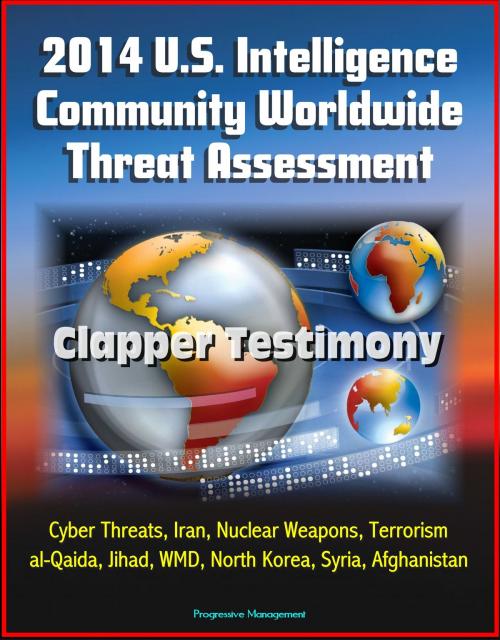2014 U.S. Intelligence Community Worldwide Threat Assessment: Clapper Testimony: Cyber Threats, Iran, Nuclear Weapons, Terrorism, al-Qaida, Jihad, WMD, North Korea, Syria, Afghanistan
Nonfiction, Social & Cultural Studies, Political Science| Author: | Progressive Management | ISBN: | 9781311362001 |
| Publisher: | Progressive Management | Publication: | January 30, 2014 |
| Imprint: | Smashwords Edition | Language: | English |
| Author: | Progressive Management |
| ISBN: | 9781311362001 |
| Publisher: | Progressive Management |
| Publication: | January 30, 2014 |
| Imprint: | Smashwords Edition |
| Language: | English |
Director of National Intelligence James R. Clapper Jr. presented the 2014 annual U.S. intelligence community worldwide threat assessment in Congressional testimony on January 20th, 2014. In the published report, Clapper provides a thorough review of the status of possible threats from a wide variety of nations and terror groups. The report highlighted that critical cyber threats are converging:
Several critical governmental, commercial, and societal changes are converging that will threaten a safe and secure online environment. In the past several years, many aspects of life have migrated to the Internet and digital networks. These include essential government functions, industry and commerce, health care, social communication, and personal information. The foreign threats discussed below pose growing risks to these functions as the public continues to increase its use of and trust in digital infrastructures and technologies.
Russia and China continue to hold views substantially divergent from the United States on the meaning and intent of international cyber security. These divergences center mostly on the nature of state sovereignty in the global information environment states' rights to control the dissemination of content online, which have long forestalled major agreements. Despite these challenges, the United Nations Group of Governmental Experts concluded in a June 2013 report that international law and the UN Charter apply to cyberspace. This conclusion represents a substantive step forward in developing a legal framework and norms for cyber security.
Threat Environment * We assess that computer network exploitation and disruption activities such as denial-of-service attacks will continue. Further, we assess that the likelihood of a destructive attack that deletes information or renders systems inoperable will increase as malware and attack tradecraft proliferate. Many instances of major cyberattacks manifested themselves at home and abroad in 2013 as illustrated by the following examples. In March 2013, South Korea suffered a sizeable cyberattack against its commercial and media networks, damaging tens of thousands of computer workstations. The attack also disrupted online banking and automated teller machine services- Although likely unrelated to the 2012 network attack against Saudi Aramco, these attacks illustrate an alarming trend in mass data-deletion and system-damaging attacks. In early 2013, the US financial sector faced wide-scale network denial-of-service attacks that became increasingly difficult and costly to mitigate.
Threats discussed in the assessment include: GLOBAL THREATS * Cyber * Counterintelligence Terrorism * Weapons of Mass Destruction and Proliferation Counterspace * Transnational Organized Crime * Economic Trends * Natural Resources Food Water Energy * Extreme Weather Events The Arctic * Health Risks * Mass Atrocities * REGIONAL THREATS * Middle East and North Africa * Arab Spring * Egypt * Syria * Iran * Iraq * Yemen * Lebanon * Libya * Tunisia * South Asia * Afghanistan * Pakistan * India * Sub-Saharan Africa * The Sahel * Somalia * East Africa * Sudan and South Sudan * Nigeria * Central African Republic * Democratic Republic of the Congo * Lord's Resistance Army * East Asia * China * North Korea * Russia and Eurasia Russia * The Caucasus and Central Asia * Ukraine, Moldova, and Belarus * Latin America and the Caribbean * Haiti * Central America * Europe * Key Partnerships * Turkey * The Western Balkans
In addition to the 2014 assessment, this compilation includes 2013 and 2012 assessments for comparison and historical reference, plus important additional material from the Senate Select Committee on Intelligence:
Intelligence Authorization Act for Fiscal Year 2014
FISA Improvements Act of 2013
Report of the Select Committee on Intelligence
Director of National Intelligence James R. Clapper Jr. presented the 2014 annual U.S. intelligence community worldwide threat assessment in Congressional testimony on January 20th, 2014. In the published report, Clapper provides a thorough review of the status of possible threats from a wide variety of nations and terror groups. The report highlighted that critical cyber threats are converging:
Several critical governmental, commercial, and societal changes are converging that will threaten a safe and secure online environment. In the past several years, many aspects of life have migrated to the Internet and digital networks. These include essential government functions, industry and commerce, health care, social communication, and personal information. The foreign threats discussed below pose growing risks to these functions as the public continues to increase its use of and trust in digital infrastructures and technologies.
Russia and China continue to hold views substantially divergent from the United States on the meaning and intent of international cyber security. These divergences center mostly on the nature of state sovereignty in the global information environment states' rights to control the dissemination of content online, which have long forestalled major agreements. Despite these challenges, the United Nations Group of Governmental Experts concluded in a June 2013 report that international law and the UN Charter apply to cyberspace. This conclusion represents a substantive step forward in developing a legal framework and norms for cyber security.
Threat Environment * We assess that computer network exploitation and disruption activities such as denial-of-service attacks will continue. Further, we assess that the likelihood of a destructive attack that deletes information or renders systems inoperable will increase as malware and attack tradecraft proliferate. Many instances of major cyberattacks manifested themselves at home and abroad in 2013 as illustrated by the following examples. In March 2013, South Korea suffered a sizeable cyberattack against its commercial and media networks, damaging tens of thousands of computer workstations. The attack also disrupted online banking and automated teller machine services- Although likely unrelated to the 2012 network attack against Saudi Aramco, these attacks illustrate an alarming trend in mass data-deletion and system-damaging attacks. In early 2013, the US financial sector faced wide-scale network denial-of-service attacks that became increasingly difficult and costly to mitigate.
Threats discussed in the assessment include: GLOBAL THREATS * Cyber * Counterintelligence Terrorism * Weapons of Mass Destruction and Proliferation Counterspace * Transnational Organized Crime * Economic Trends * Natural Resources Food Water Energy * Extreme Weather Events The Arctic * Health Risks * Mass Atrocities * REGIONAL THREATS * Middle East and North Africa * Arab Spring * Egypt * Syria * Iran * Iraq * Yemen * Lebanon * Libya * Tunisia * South Asia * Afghanistan * Pakistan * India * Sub-Saharan Africa * The Sahel * Somalia * East Africa * Sudan and South Sudan * Nigeria * Central African Republic * Democratic Republic of the Congo * Lord's Resistance Army * East Asia * China * North Korea * Russia and Eurasia Russia * The Caucasus and Central Asia * Ukraine, Moldova, and Belarus * Latin America and the Caribbean * Haiti * Central America * Europe * Key Partnerships * Turkey * The Western Balkans
In addition to the 2014 assessment, this compilation includes 2013 and 2012 assessments for comparison and historical reference, plus important additional material from the Senate Select Committee on Intelligence:
Intelligence Authorization Act for Fiscal Year 2014
FISA Improvements Act of 2013
Report of the Select Committee on Intelligence















